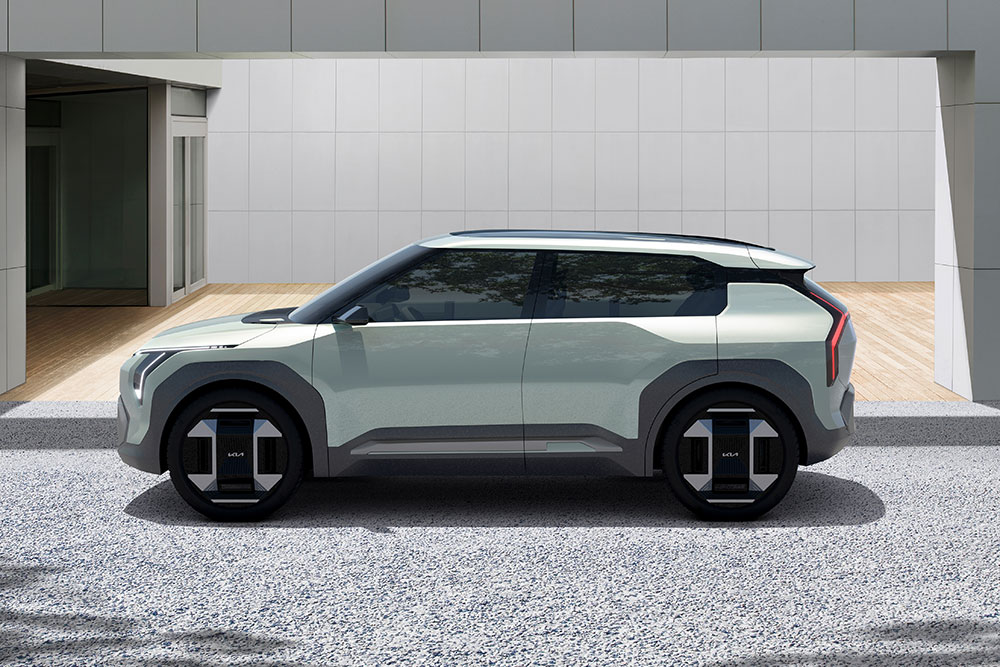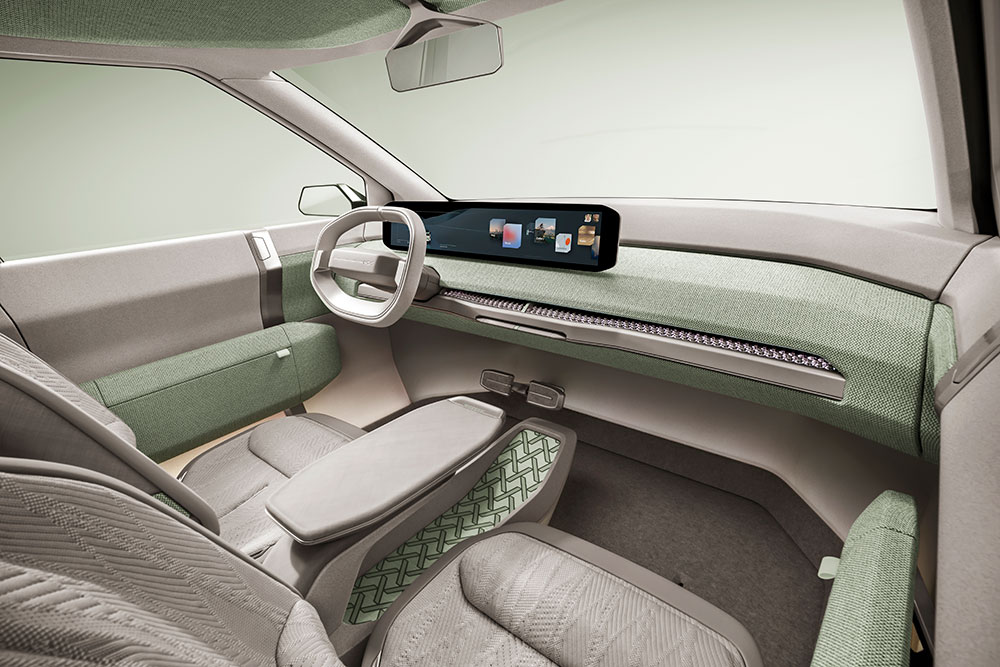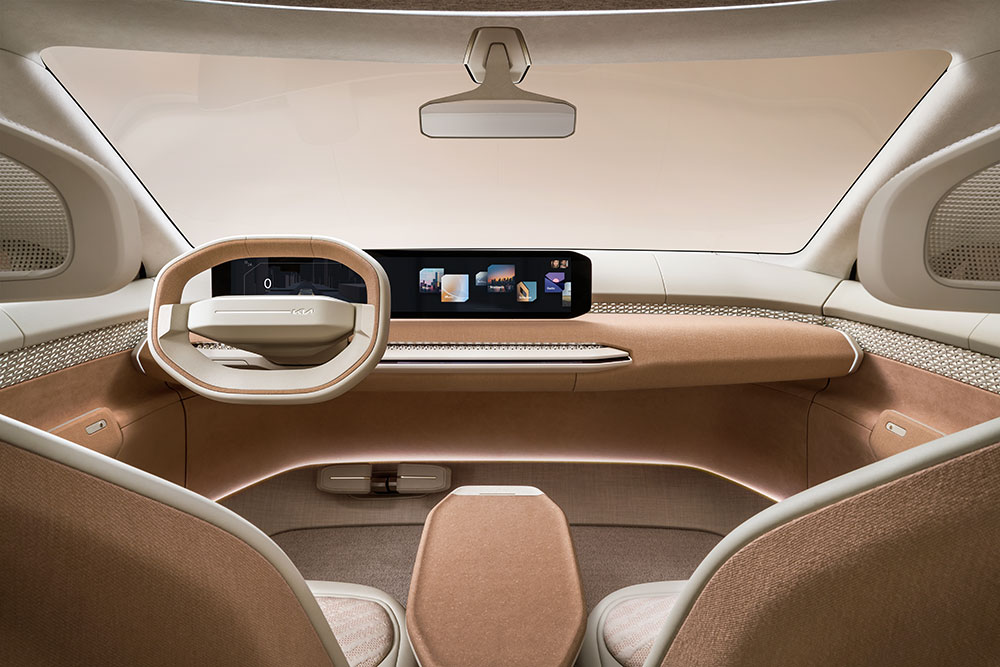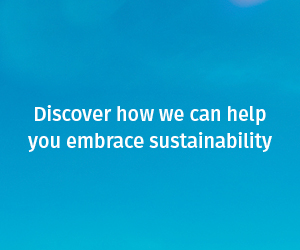Kia’s eco-friendly concepts

Hemp fibres, mushroom roots, walnut shells and madder roots might sound like the ingredients for some kind of new-age smoothy, but they’re all materials Kia is considering including in its next-generation vehicles to make them more sustainable.
The Korean car maker recently released details of the interiors of its EV3 and EV4 concept cars, featuring what it describes as game-changing eco-friendly materials and methodologies, designed to play an essential role in the brand’s transition to sustainable mobility solutions provider.
When creating the interior of the Concept EV3 and EV4, for instance, Kia’s design team utilised sustainable fibre weaves to deliver a lightweight, slimmer seat design, plus 3D knit technology which reduces stitching and joins resulting in zero waste.
Additionally, the material chosen for the EV3’s console table was not manufactured but grown in a process known as bio fabrication.

Kia Concept EV3 interior.
The material called ‘mycelium’ comes from mushroom roots, is claimed to combine excellent strength with an extremely soft surface and can be grown in any shape using a mould.
To create the striking cabin of the Concept EV4, Kia’s interior designers applied natural dyes from madder roots and walnut shells to 100% recycled cotton.
The hand-woven fabric strips were then applied to the car’s storage area and dashboard to create a unique and natural-looking effect.
The EV4 also features a console table created using hemp fibres, with hemp a rapidly growing plant that requires minimal resources to cultivate, so is highly sustainable in addition to being a versatile material to work with.
Kia first began integrating sustainable materials in its vehicles with the use of bioplastic and sugar-cane bio fibre in the 2014 Soul EV.

Kia Concept EV4 interior.
The brand’s flagship EV9 seven-seat electric SUV, which launches here in November, will be the first to introduce the brand’s 10 must-have sustainable items which will be a part of all new Kia model lines.
Kia’s 10 must-have sustainable items include bioplastic, produced from biomass sources such as vegetable oils, corn extract, sawdust and sugarcane, and used in vehicle components such as dashboards, consoles, pillars, and trim.
Bio polyurethane (PU), which incorporates plant-based components, is used as a leather replacement, while the vehicle carpets and fabrics can be created from 100% recycled PET plastic, with a proportion of this material being sourced from recycled fishing nets.
Other items that form the 10 must-haves are PCM, or post-consumer recycled plastic, bio PU foam in seats and headrests, bio paint created using rapeseed oil, BTX-free paint (benzene, toluene and xylene), recycled PET yarn in seat stitching, and recycled PET felt for areas requiring sound insulation.
Related topics
Things to note
The information in this article has been prepared for general information purposes only and is not intended as legal advice or specific advice to any particular person. Any advice contained in the document is general advice, not intended as legal advice or professional advice and does not take into account any person’s particular circumstances. Before acting on anything based on this advice you should consider its appropriateness to you, having regard to your objectives and needs.
Insurance Products (excluding Travel Insurance) are issued by RACQ Insurance Limited ABN 50 009 704 152 (RACQI) and arranged by RACQ Distribution Services Pty Ltd (RDS) ABN 35 116 361 650, AFSL 567130 and RDS' authorised representatives (including RACQ Operations Pty Ltd ABN 80 009 663 414, AR No. 234978 (RACQO)). Conditions, limits and exclusions apply.
Any advice provided by RDS and RACQO is general advice only and does not take into account your personal objectives, financial situation or needs and you will need to consider whether the advice is appropriate for you. Read the Product Disclosure Statement (PDS) before making a purchase decision on the product. You can also access our Target Market Determinations on this website.
RDS receives a commission from RACQI for the policies it arranges. RACQO receives fees paid for services it provides to RDS. Further details about remuneration are available on request prior to purchasing.
Banking and loan products issued by Members Banking Group Limited ABN 83 087 651 054 AFSL/Australian credit licence 241195 trading as RACQ Bank. Terms, conditions, fees, charges and lending policies apply. This is general advice only and may not be right for you. This information does not take your personal objectives, circumstances or needs into account. Read the disclosure documents for your selected product or service, including the Financial Services Guide and the Terms and Conditions, and consider if appropriate for you before deciding.
Except for RACQ Bank, any RACQ entity referred to on this page is not an authorised deposit-taking institution for the purposes of the Banking Act 1959 (Cth). That entity’s obligations do not represent deposits or other liabilities of RACQ Bank. RACQ Bank does not guarantee or otherwise provide assurance in respect of the obligations of that entity, unless noted otherwise.
RACQ Bank subscribes to the Customer Owned Banking Code of Practice which establishes higher standards than the law requires. The Code reflects modern consumer expectations and developments in approaches to issues such as consumer vulnerability, guarantors, and supporting customers through financial hardship. Please read our Customer Owned Banking Code of Practice page for more information.
RACQ Operations Pty Ltd (ABN 80 009 663 414 AR 000234978) and Members Travel Group Pty Ltd (ABN 45 144 538 803 AR 000432492) are acting as an Authorised Representative of the issuer of the insurance, Tokio Marine & Nichido Fire Insurance Co., Ltd. (ABN 80 000 438 291 AFSL 246 548). Any advice set out above is general in nature only, and does not take into account your objectives, financial situation or needs. Before purchasing any travel products, please consider the RACQ Travel Insurance Product Disclosure Statement (PDS) and the Target Market Determinations (TMDs) that apply to these products. Whilst the PDS outlines the Terms and Conditions of these products, the TMDs outline the intended class of customers that comprise the target market for these travel products. This will allow you to consider which products best suit your objectives, financial situation and needs and consider the products appropriateness to your personal circumstances. TMDs also outline matters involving the distribution and the review of these products. The PDS, Supplementary PDS and TMDs for each travel product can be found here.

